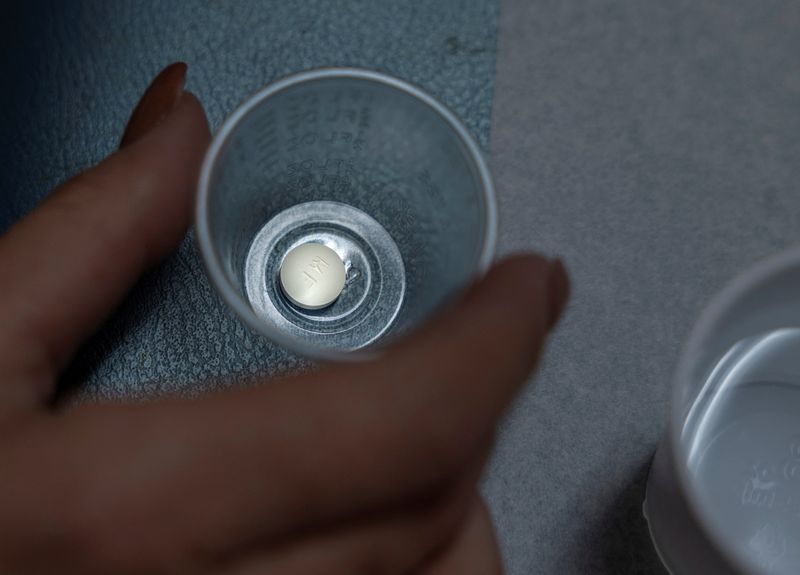By Brendan Pierson
(Reuters) - U.S. Supreme Court Justice Samuel Alito has temporarily put a lower court order imposing significant restrictions on the distribution of the abortion drug mifepristone on hold through next Wednesday as the high court considers a request by the Biden administration to block the restrictions.
The order stems from a lawsuit brought by anti-abortion groups and doctors seeking to ban the pill. Here is what you need to know about the case as it further unfolds:
WHAT IS MEDICATION ABORTION?
Medication abortion is a two-drug regimen consisting of mifepristone followed by misoprostol used to terminate a pregnancy within the first 10 weeks. It accounts for more than half of U.S. abortions.
HOW DID THE LEGAL DISPUTE OVER THE DRUG BEGIN?
Anti-abortion medical associations led by the Texas-based Alliance for Hippocratic Medicine sued the U.S. Food and Drug Administration last year in federal court in Amarillo, Texas, claiming the agency approved mifepristone for abortion in 2000 using an unlawful process and did not adequately consider the drug's safety. They asked U.S. District Judge Matthew Kacsmaryk, who is presiding over the lawsuit, to revoke the drug's approval, effectively pulling it off the market.
HOW DID IT REACH THE SUPREME COURT?
Kacsmaryk on April 7 issued a temporary order, known as a preliminary injunction, suspending the drug's approval while the lawsuit proceeds. The Biden administration asked the 5th U.S. Circuit Court of Appeals for an emergency stay putting his injunction on hold.
The 5th Circuit ruled on Wednesday that the drug can stay on the market, but with serious restrictions, including a requirement that it be dispensed by a doctor in person and a limit on its use to the first seven weeks of pregnancy, down from 10.
The administration is now asking the Supreme Court overrule the 5th Circuit and to put Kacsmaryk's order on hold in its entirety, which would keep mifepristone available without any new restrictions while the lawsuit is pending.
WHAT WILL HAPPEN NEXT?
Like all emergency petitions from the 5th Circuit, the case initially went to U.S. Supreme Court Justice Samuel Alito, who on Friday put Kacsmaryk's order on hold through next Wednesday to give the court more time to consider the petition. Alito will likely refer the case to the full court, which has a 6-3 conservative majority.
At least through Wednesday, there will be no new restrictions on mifepristone. Both the Biden administration and the drug's maker, Danco Laboratories, have said if the Supreme Court allows the restrictions to take effect, mifepristone could be unavailable for months while the company changes its label and distribution system to comply.
Whether or not the Supreme Court decides to stay Kacsmaryk's order, it will not decide the merits of the case. Rather, the court will determine whether and how mifepristone can be distributed while the case is pending.
WHAT ABOUT THE RULING FROM WASHINGTON STATE?
Minutes after Kacsmaryk's order on April 7, U.S. District Judge Thomas Rice in Spokane, Washington ordered the FDA not to make any changes to mifepristone access. That ruling applies only in 17 Democratic-led states and the District of Columbia, which had argued the government should loosen special safety restrictions around the pill.
The Biden administration said in its petition to the Supreme Court that the FDA cannot comply with both orders.
CAN THE FDA DO ANYTHING TO KEEP MIFEPRISTONE AVAILABLE?
Legal experts have said that the FDA has discretion over what it will enforce, potentially allowing it to preserve less restricted access to the drug at least while the case is proceeding. However, the agency has so far given no indication that it is considering that step.
WHAT HAPPENS AFTER THE SUPREME COURT RULES?
Whichever way the Supreme Court rules, it will send the case back to the 5th Circuit, where the FDA will pursue a full appeal of Kacsmaryk's preliminary injunction. The agency and the anti-abortion groups will both have a chance to file briefs, and the case is scheduled to be argued before a three-judge panel on May 17.
That appeal process could last months. The losing party could petition for rehearing with all judges of the 5th Circuit, known as en banc rehearing, and ultimately petition the Supreme Court once again.
WHEN WILL THE CASE BE FINALLY DECIDED?
Once all appeals over the preliminary injunction are over, the case can proceed to trial on the merits before Kacsmaryk, giving both sides a chance to present factual evidence.
The FDA will need to produce evidence about the process leading to mifepristone's original approval in 2000, as well as for the changes it made in 2016 and later.
The anti-abortion groups will have to offer evidence to support their claim that the process was improper, and that mifepristone is dangerous. The two sides will exchange evidence in a process known as discovery.

Kacsmaryk could then decide the case without trial, known as summary judgment, or hold a trial including witness testimony.
A final resolution could be months or years away. Once it does come, the losing side will again have the chance to appeal to the 5th Circuit and, eventually, the Supreme Court.